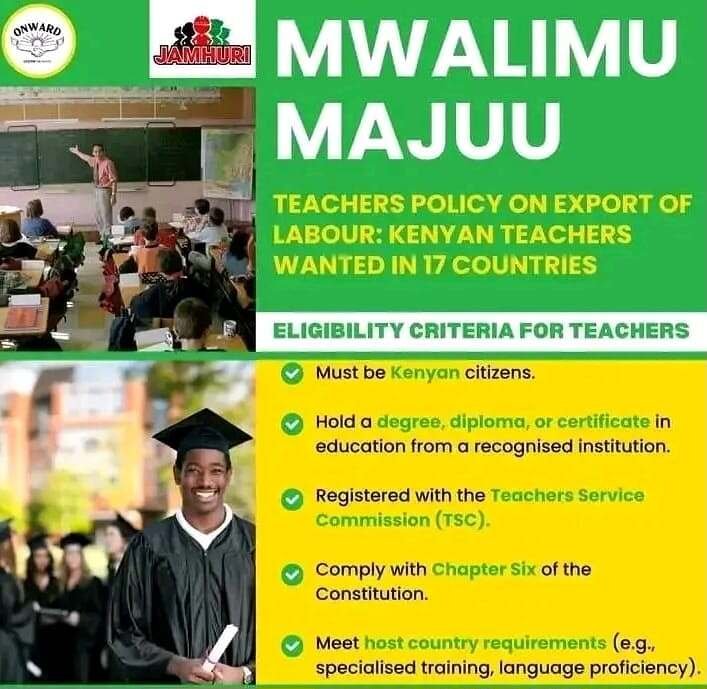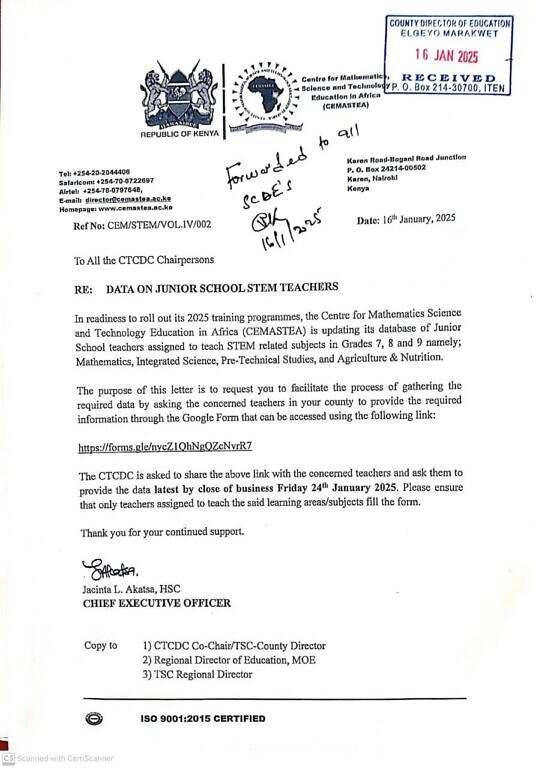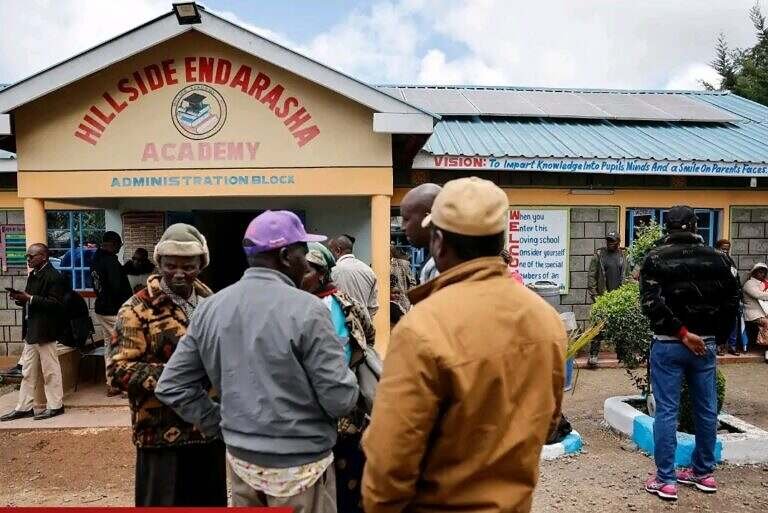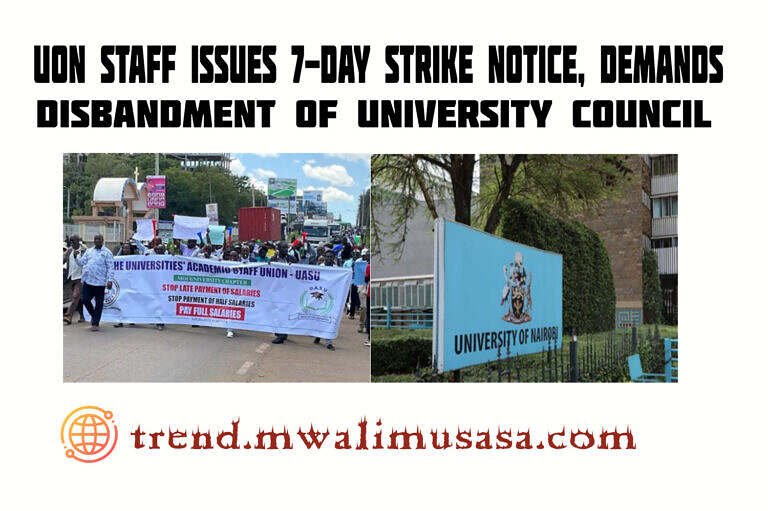
The ‘Mwalimu Majuu’ initiative stands as a pivotal program established to facilitate the exportation of Kenyan teachers, particularly those trained at the P1 level in primary education. This initiative is designed to bridge the gap between the demand for qualified educators in various global markets and the supply of skilled teachers from Kenya. In recent years, the international job landscape has expanded significantly, creating increased opportunities for P1 teachers to pursue careers abroad. The Mwalimu Maju program is responsive to this trend, aiming to empower teachers by connecting them with positions that not only uplift their professional stature but also contribute to the educational advancements of the host countries.
As countries around the world grapple with teacher shortages, the Mwalimu Maju initiative becomes even more relevant. It strategically positions Kenyan P1 teachers to fill these gaps, particularly in regions where there is a burgeoning need for educators in primary education. With many nations aspiring to enhance their educational systems, skilled teachers from Kenya represent a viable solution. This initiative does not merely focus on providing employment opportunities but also emphasizes the exchange of diverse educational methods and cultural insights, enriching the educational environments in which these teachers will work.
The Mwalimu Maju program is envisioned to be mutually beneficial, helping P1 teachers gain international experience while simultaneously addressing the pressing teacher shortages faced by many countries. By employing Kenyan teachers, these countries tap into a workforce that is not only well-trained but also possesses unique perspectives that can significantly enhance the global teaching landscape. Thus, the program is a response to the increasing globalization of education and a reflection of Kenya’s commitment to contributing to global educational standards.
Eligibility Criteria for P1 Teachers
The Mwalimu Maju Program presents a significant opportunity for P1 teachers seeking to expand their professional horizons internationally. However, participation in this program is bound by specific eligibility criteria, which must be strictly adhered to by all applicants. Firstly, it is paramount that candidates possess Kenyan citizenship. This requirement is crucial in confirming the nationality of applicants and ensuring compliance with local regulations concerning employment abroad.
In addition to citizenship, candidates are required to hold a valid P1 certificate or a relevant degree in education from a recognized institution. This educational qualification serves as a fundamental requirement, confirming that applicants possess the necessary pedagogical skills and knowledge essential for teaching roles. Furthermore, being registered with the Teachers Service Commission (TSC) is a non-negotiable component of the eligibility criteria. Registration with TSC validates the teacher’s professional standing and compliance with national teaching regulations.
Moreover, adherence to integrity standards as stipulated in Chapter Six of the Constitution of Kenya is a pivotal element. This chapter emphasizes the need for ethical conduct, which is imperative for educators seeking to foster trust and accountability in their practice abroad. It aligns with global standards of professional conduct, thereby enhancing the credibility of Kenyan teachers in foreign educational environments.
Additionally, potential applicants should consider that host countries may impose extra requirements. These can include specialized training in specific pedagogical approaches or proficiency in the local language, making it essential for teachers to prepare accordingly. Such prerequisites not only enhance the employability of the teachers but also ensure successful integration into foreign educational systems, thereby maximizing the benefits of the Mwalimu Maju Program for all stakeholders involved.
Why P1 Teachers are Perfect for Global Opportunities
P1 teachers from Kenya possess a unique combination of qualifications and abilities that render them ideal candidates for teaching positions abroad. Their extensive experience in foundation learning equips them with the skills necessary to effectively nurture young minds, making them an asset in diverse primary education settings worldwide. In the context of international education, where adaptability and broad teaching methods are crucial, P1 teachers stand out due to their formal training and practical experience in tackling various learning challenges at the foundational level.
Moreover, the cultural adaptability of Kenyan P1 teachers significantly enhances their prospects in global teaching markets. Their training exposes them to diverse cultural contexts, enabling them to engage and inspire students from different backgrounds. P1 teachers are accustomed to working in dynamic environments, which positions them favorably in countries seeking educators who can accommodate various learning styles and cultural nuances. This adaptability is instrumental in fostering inclusive learning environments, reflecting the global trend towards recognizing and celebrating diversity in classrooms.
Additionally, many P1 teachers are bilingual, proficient in both English and Kiswahili. This bilingualism is a compelling advantage in international teaching markets where English is the primary language of instruction. Their ability to communicate in multiple languages not only enables them to connect with students more effectively but also enriches the learning experience for non-native speakers. Bilingual proficiency increases their employability, as many schools seek educators capable of bridging language gaps and supporting multilingual classrooms. Overall, the unique qualifications, cultural adaptability, and linguistic skills of P1 teachers position them as strong contenders for fulfilling vital teaching roles around the world.
Opportunities for P1 Teachers in Specific Countries
The global demand for primary-level teachers, specifically those qualified under the Mwalimu Maju Program, presents numerous opportunities across various countries. Notably, countries like the USA, Ireland, and the United Arab Emirates (UAE) have shown significant interest in hiring teachers proficient in English. These countries not only offer competitive salaries but also provide enriching experiences in culturally diverse environments. The need for English instructors in these regions has surged, particularly as educational institutions seek to enhance their English language curricula and improve students’ communication skills.
In addition to conventional English teaching positions, there is a noteworthy increase in the demand for Kiswahili teachers, especially in South Africa, Botswana, and Japan. South Africa and Botswana have vibrant communities eager to learn Kiswahili, given the language’s importance in East Africa. These regions are exploring Kiswahili immersion programs to foster cultural understanding and enhance communication within their communities. Japan, on the other hand, has exhibited a growing interest in learning Kiswahili, motivated by the country’s economic ties with African nations and a desire to facilitate better interaction and mutual understanding.
Moreover, for P1 teachers with qualifications in special needs education, opportunities abound particularly in Japan and the UAE. Both countries are becoming increasingly aware of the importance of inclusive education and are actively seeking educators who can cater to the diverse learning needs of their students. This demand for specialized teaching not only highlights the global recognition of special needs education but also opens doors for professional growth for P1 teachers. As such, individuals in this field can find meaningful careers while positively impacting the lives of students in various regions around the world.
Preparing to Apply for Global Teaching Jobs
As P1 teachers seek to secure global teaching positions under the Mwalimu Maju Program, thorough preparation is crucial. One of the first steps involves upgrading one’s skill set to enhance employability in the global education market. Engaging in additional training in specialized areas such as English as a Second Language (ESL) or special needs education can significantly boost a teacher’s appeal. These qualifications not only provide teachers with valuable strategies for diverse classrooms but also align them with the expectations of international employers who often prioritize flexibility in teaching methodologies.
Additionally, certifying language proficiency is essential for P1 teachers aspiring to teach in non-native English-speaking countries. Completing recognized language tests, such as the Test of English as a Foreign Language (TOEFL) or the International English Language Testing System (IELTS), demonstrates a teacher’s ability to communicate effectively in English. Proficiency in the language often becomes a prerequisite for many global teaching positions, serving as a gateway for success in an international classroom.
Furthermore, crafting a compelling resume is critical for showcasing international teaching potential. Teachers should highlight their adaptability to new environments, cultural competence, and experience working in diverse educational settings. It is beneficial to include specific instances where they have employed innovative teaching techniques or successfully managed multicultural classrooms. This will not only appeal to potential employers but also set candidates apart in a competitive job market.
Lastly, thorough research into prospective host countries is paramount. Understanding the cultural norms, educational expectations, and professional requirements of these locations can enable teachers to tailor their applications effectively. By comprehending the intricacies of each country’s education system, P1 teachers can better express their enthusiasm and readiness to contribute positively to global education.
Challenges P1 Teachers Might Face
Transitioning to teach abroad under the Mwalimu Maju Program presents P1 teachers with a range of challenges that must be navigated to ensure a successful experience. One of the primary hurdles is the recognition of their qualifications. Depending on the host country, P1 teachers may find that their existing certifications do not meet local standards, which could require them to undertake additional training or certification programs. This not only adds to the time frame for starting their teaching careers abroad but also can create uncertainty about their employability in international settings.
Another significant challenge relates to cultural adjustments. P1 teachers will encounter differing educational philosophies and teaching methodologies within the new environment. They must be prepared to adapt their own teaching styles to align with local practices while maintaining their educational principles. This may involve learning a new curriculum, engaging with different student demographics, and adjusting to various classroom management techniques. Moreover, differing societal expectations regarding education, authority, and student engagement can impact the effectiveness of their teaching and require considerable adaptation.
The financial aspects of relocating for teaching opportunities also pose challenges for P1 teachers. The costs associated with visa applications, required certifications, and potential relocation expenses can be substantial. In addition, teachers may face initial hardships due to delayed salary payments as they acclimate to their new positions. Access to funding or financial assistance programs can aid teachers in managing these expenses, yet it remains crucial for them to budget and plan accordingly. Understanding these challenges will help P1 teachers prepare more effectively for their transition, ensuring a smoother adjustment to their new roles overseas.
Conclusion
The ‘Mwalimu Maju’ initiative represents a significant opportunity for Kenyan P1 teachers who aspire to broaden their teaching careers on an international scale. By facilitating the movement of skilled educators across borders, this program not only enhances the exposure of teachers to diverse educational philosophies and methodologies but also fosters global collaboration in the field of education. As P1 teachers contemplate the prospects of teaching abroad, it is essential that they thoroughly understand and meet all the outlined requirements stipulated by the program. This ensures a smoother transition into global teaching environments and maximizes the benefits derived from the international experience.
Considering the numerous avenues that ‘Mwalimu Maju’ opens up, it is imperative for teachers to proactively explore these possibilities. Engaging with the resources provided, such as application guides and official government links, will equip teachers with the necessary information to navigate the process effectively. By taking these proactive steps, educators can significantly enhance their chances of not just applying successfully but also thriving in international settings, bringing their unique perspectives back home.
We encourage all P1 teachers to share their thoughts on the initiative and any future plans they have regarding the ‘Mwalimu Maju’ program in the comments section below. Your insights and experiences might be invaluable to your peers considering similar paths. Moreover, continue to keep abreast of updates regarding this program and other relevant professional opportunities by regularly visiting official government resources. Together, let us embrace this remarkable venture in education and contribute to the global learning community.






When is application taking place and where?